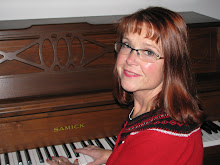- Music enhances brain development, especially since it stimulates the connection of 'sensory-cognitive-motor' development building the neuro-connections stronger and more complex
- Art activities can develop sensory stimulation, patterning, and conceptual awareness
- Role-playing helps toddlers understand their world: experimenting and practicing roles--they can express how they feel about other people; they can practice with rules;
- Music activities enrich memory abilities
- Toddlers love to bang on pots and pans and oatmeal boxes--builds creativity, motor development, sensory awareness, and rhythm.
- They love to march, and dance to music (don't forget the Classical Stuff!). Provide scarves, instruments, and ribbons to dance and march with
- Finger painting is F-U-N! Try finger painting in a bag (place paints in a re-sealable bag and 'paint' by drawing with fingers on the outside of the bag)
- Provide a box full of hats and gloves and shoes to dress up in--provide a full-sized mirror so they can see what they look like
- And don't forget sensory material: cornmeal, shaving cream, pudding, ice, rice, water, sand, flower, bells, Easter grass, sandpaper, silk, cotton balls
- Attach some "mac-tac" to the wall (sticky side out) and provide a variety of materials for mounting on their mural: magazine pictures and words, ribbons, popsicle sticks, pebbles, buttons, textured paper and material, pre-cut shapes
- Make musical shakers out of any container. With two shakers of each sound, they can compare and find the matching sounds
- Play "SH!!!! Shakers" by keeping one shaker empty. Have them find the SH!!! Shaker (the silent one).
- Chanting Box: place two of several different objects inside a box (objects that have names of 1, 2, and 3 syllables long). Have child pull out 4 objects creating the words for a chant (Ex. leather mitten, leather mitten, blue shoe, cup) This builds not only language skills but the rhythm of speech and of music
- Sing songs and do fingerplays: repetition of these songs develop memory skills, rhythm, and language
- Sing, chant, act, and speak with varying voice tones and pitches -- developing sound discrimination skills
How Kindermusik brings the Arts to Toddlers
Simply put, Kindermusik is a music and movement program. Each week in class we play, listen, and dance to music that will impact you and your child in profound ways. That’s because every song, story, and two-step has a carefully chosen purpose in this creative curriculum—one that’s designed to stimulate and strengthen the vital neural wiring taking place in your child’s mind, right now. A Kindermusik educator will guide you every step of the way so you know how each activity contributes to your child’s overall growth and development.
The latest research with proven methods—that’s Kindermusik, too. Our child-centered curricula incorporate ongoing, in-classroom studies with our own, 30-years’ experience in music and child development. Plus, we’ve combined the best music learning methods found in Orff, Kodaly, and Suzuki.
“Take-home” books, instruments and CDs from class let you take learning with you wherever you go. All while strengthening the emotional bond between you and your child.
So whether it’s twirling under a sea of scarves, experimenting with age-appropriate instruments, singing about a scampering squirrel, creating a musical ensemble, or snuggling in your lap during story time, Kindermusik speaks your child’s language and offers her (and you!) the best music and movement class available.
Behold . . . the Power of Kindermusik!
We know we’re being dramatic, but I’m afraid we won’t apologize . . . because the research about music and children’s development is truly jaw-dropping. In the last couple of years, the eyes of the research community have turned increasingly to music, and the marvels and mysteries they have discovered are nothing short of amazing (though perhaps not exactly surprising to people who’ve regularly witnessed its effect). The bottom line: early, positive, age-appropriate experiences with music—like Kindermusik—can have a remarkable and research-proven impact on children’s learning, including language and literacy skills (e.g., vocabulary, comprehension, listening, expression); social and emotional development; mathematics and pattern-recognition skills; and even ability to plan, guide, and self-regulate behavior. It’s a lot to keep track of, so we’ve summarized the latest research on the benefits of Kindermusik-style music and movement experiences. Take a look . . .
Music & Literacy
Early music experiences can have a significant impact on literacy and reading. According to experts, learning to read depends on acquiring a variety of skills, including phonological processing, oral language, and comprehension.




No comments:
Post a Comment